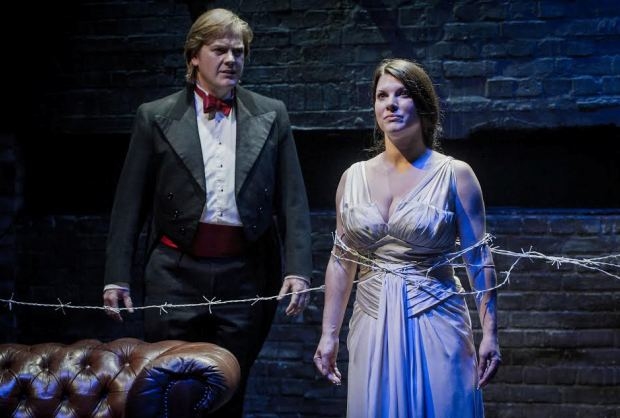Daphne (Arcola Theatre)

© Robert Workman
Yet for all the production’s shortcomings it’s a wonder Daphne's being done at all, and bouquets to Opera At Home for that. Somehow they’ve cajoled several decent professional singers into learning intricate, taxing roles that they’ll sing a handful of times at best.
Richard Strauss’s rarely performed late opera retells the myth of a virtuous nature lover who spurns two suitors and is turned into a tree by one of them, who happens to be the god Apollo. It’s a slender tale from which first-time collaborator Joseph Gregor spun a prolix libretto that inspired the composer only sporadically. At its best, though, it possesses a distinctive rhapsodic beauty.
Much of that beauty arises from the marriage of melody and orchestration, and there’s a problem. If the voices aren’t able to cushion themselves in Strauss’s succulent chromaticism they’re exposed and alone; sadly, well as pianist Marta Lopez rendered the score, she could never replace a seventy-piece orchestra. Imagine 'The Fighting Temeraire' as a pencil sketch and you’ll get the idea.
Still, better that than nothing at all, especially since for most in the audience this will have been their first live experience of Daphne. And vocally it wasn’t at all bad. It was thrilling to hear a genuine contralto, Violetta Gawara, sing the role of Daphne’s mother Gaea, and there were nicely drawn turns from Milena Dobrzycka and Erika Madi Jones as a pair of Genet-like maids.
'A beeline for the obvious'
James Gower made the most of the underwritten Peneios, while it’s hardly tenor Panos Ntourntoufis‘s fault that he was required to play failed lover Leukippos as a village idiot in a straw hat with, you’ve guessed it, the top missing. John Upperton sang Apollo, another high voice role (and how odd of Strauss, famously not a fan, to make both of his principal men tenors), with a tempered-steel delivery as expressive as his face was impassive.
Director-conductor José Manuel Gandia makes a beeline for the obvious in setting this 1936 German opera at the time of its composition, with members of a nascent Third Reich behaving badly on a country estate, and he proceeds to stage it with little evidence of technical know-how. A director’s job is to serve the score and not let the production trip over the furniture – or itself – but he falls short on both counts. A curious variation on the Nazi salute comes across like upper-body calisthenics; Apollo releases his imaginary arrow like a Usain bolt.
The admirable Justine Viani, who sings the title role’s high-lying tessitura with flair and (mostly) sustained tonal beauty, delivers two great arias at the opera's conclusion, but both have problems. Blame for the first of them, an extended lyrical lament to the dead Leukippos that expresses a grief quite unearned by her character, lies with Strauss. The second is a directorial howler during our heroine's final hymn of transfiguration, easily the most melting moment in the opera. That's when Gandia chooses to pile up the bodies, death camp style, and wrap the stage in barbed wire using the newly-arborealised Daphne as a fence post. Big chortles and bad taste.










